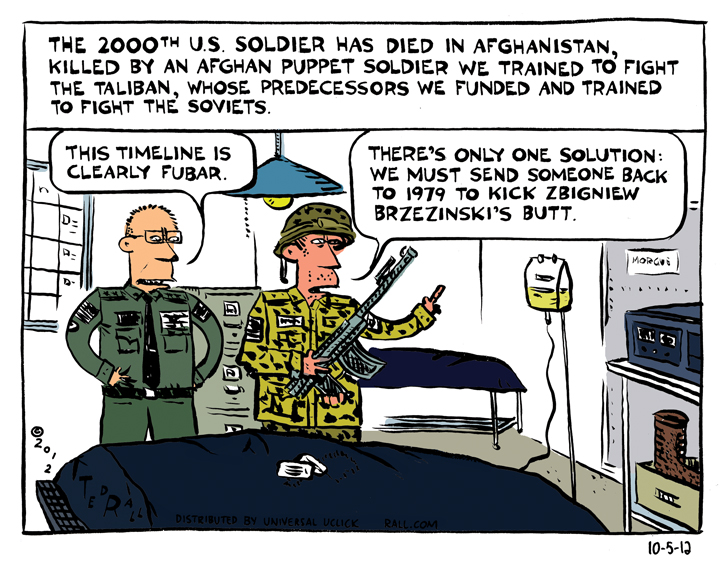
Many progressives are stupid. Unless they get smart soon, “The Resistance” to Donald Trump will fail, just like everything else the Left has tried to do for the last 40 years.
Stupid progressive thing #1: letting yourself be shocked by Trump.
Far too many lefties still can’t believe that the Orange One won the election, or that as president he’s so stupid and mean and right-wing.
Know the cliché, “if you’re not angry you’re not paying attention”? If you didn’t see Trump’s victory coming, you weren’t paying attention to the anger of your fellow citizens — and neither was the Democratic Party. NAFTA cost a million Americans their jobs. Since the 1970s automation has put 7 million people out of work. Democrats marketed themselves as the party of Joe and Jane Sixpack, but Bill Clinton pushed for and signed NAFTA, a Republican idea. Neither Clinton nor Obama lifted a finger to save the Rust Belt; as a candidate Hillary Clinton didn’t care either.
For those who opened their eyes to see, every aspect of Trump’s “surprise” win was visible in plain sight.
2016’s Rust Belt Trumpers were yesteryear’s Reagan Democrats and the “angry white males” of the 1990s.
Democratic disunity was another big factor. But the schism between Hillary Clinton corporate Democrats and Bernie Sanders progressives directly paralleled the 1980 split between Jimmy Carter and Ted Kennedy.
Shocked by Trump’s radical anti-intellectualism? That his only qualification for the nation’s highest political office was celebrity? Don’t be.
Trump is merely the logical culmination of a trend that goes back at least to celebrity politicians John Glenn, Clint Eastwood, Ronald Reagan, Arnold Schwarzenegger, Jesse Ventura and Al Franken, all of whom exploited their celebrity to defeat more experienced public servants. Though George W. Bush and Obama both had legislative experience, neither man accomplished much before running for president. Both famously adjusted their voices and accents to come off as dumber than they were.
Trump wasn’t a surprise. He wasn’t an anomaly. American politics won’t get nicer or smarter after he’s gone. He’s crazy and mean and dangerous — but he’s not a bizarre departure from the American norm.
Stupid progressive thing #2: viewing Trump’s politics as significantly more dangerous or extreme than, say, Obama’s.
Worried that Trump will pull a Greg Stillson (“the missiles are flying”) on North Korea? Me too. But please get real. Trump’s needlessly bellicose rhetoric and gleeful overuse of the war machine hardly represent a radical shift in foreign policy from his predecessors. Obama gleefully ordered a political assassination (Osama bin Laden), financed civil wars that destroyed Libya and Syria, slaughtered thousands of civilians with drones and joked about it. All Trump did was alter the tone of U.S. propaganda from fake they-made-me-do-it to his more honest I-like-it.
Stupid progressive thing #3: always reacting, never acting.
Benghazi wasn’t a real issue that Americans cared about. Fox News zeroed in on it, pimped it, and pounded away at Obama-Clinton’s alleged responsibility for the deaths of American diplomats in Libya until it gained traction and ultimately became a Thing. Republicans know how to alter the playing field.
Contrast that to issues progressives actually care about, like Trump’s pardon of former Arizona sheriff Joe Arpaio. Aware that his decision would be controversial, Trump released the news late Friday — a classic media dump. Not only that, Hurricane Harvey was about to hit Houston. The Arpaio story got swept away by a flood of Houston headlines.
It’s so easy to play progressives.
Weekends pass. So do hurricanes. Why didn’t progressives schedule some big anti-Arpaio/Trump demonstrations for late the following week? Just put a reminder into your phone! Because they’re used to reacting. Progressives will never win unless they steal a page from the GOP playbook and start setting the agenda — and pounding away at it relentlessly, lack of reaction be damned.
Stupid progressive thing #4: never learning from past mistakes.
Fighting the last war — fixing the mistakes you made last time without anticipating the challenges of the next encounter — is a classic error of strategy. But progressives aren’t even good enough to make that error. They don’t even learn from their previous screw-ups.
Inspired by Tahrir Square, the 2011 Occupy Wall Street movement suffered from its lack of centralized leadership, a lack of formal demands, its welcoming of the homeless and mentally ill and a rift between revolutionary and reformist wings. But OWS’ biggest mistake was calendrical.
They occupied public parks. Parks are outside. OWS began in the fall. The weather got cold, occupiers drifted away, morale turned sad. By the time Obama smashed the encampments with federally-coordinated violent raids, there wasn’t much of a movement left to destroy.
Here we go again.
Refuse Fascism has a plan to get rid of Trump. “On Saturday, November 4—approximately a year after President Donald Trump’s election—members of the Resistance will descend on America’s major cities,” reports The Politico. “They’ll march and demonstrate, as they have in the past, but this time, say organizers, they won’t go home at the end of the day. Instead, the plan is to occupy city centers and parks and not leave until, and only until, Trump and Vice President Mike Pence have fallen.”
November.
It’s cold in November.
I know, I know — it’s easy to criticize. Which is why I chose criticism as a job. So let me offer a concrete suggestion.
Starting in November? Occupy indoor spaces.
(Ted Rall (Twitter: @tedrall) is author of “Trump: A Graphic Biography,” an examination of the life of the Republican presidential nominee in comics form. You can support Ted’s hard-hitting political cartoons and columns and see his work first by sponsoring his work on Patreon.)

 Donald Trump wants to
Donald Trump wants to  Hey Bernie supporters: Hillary has a talking point for you.
Hey Bernie supporters: Hillary has a talking point for you.

